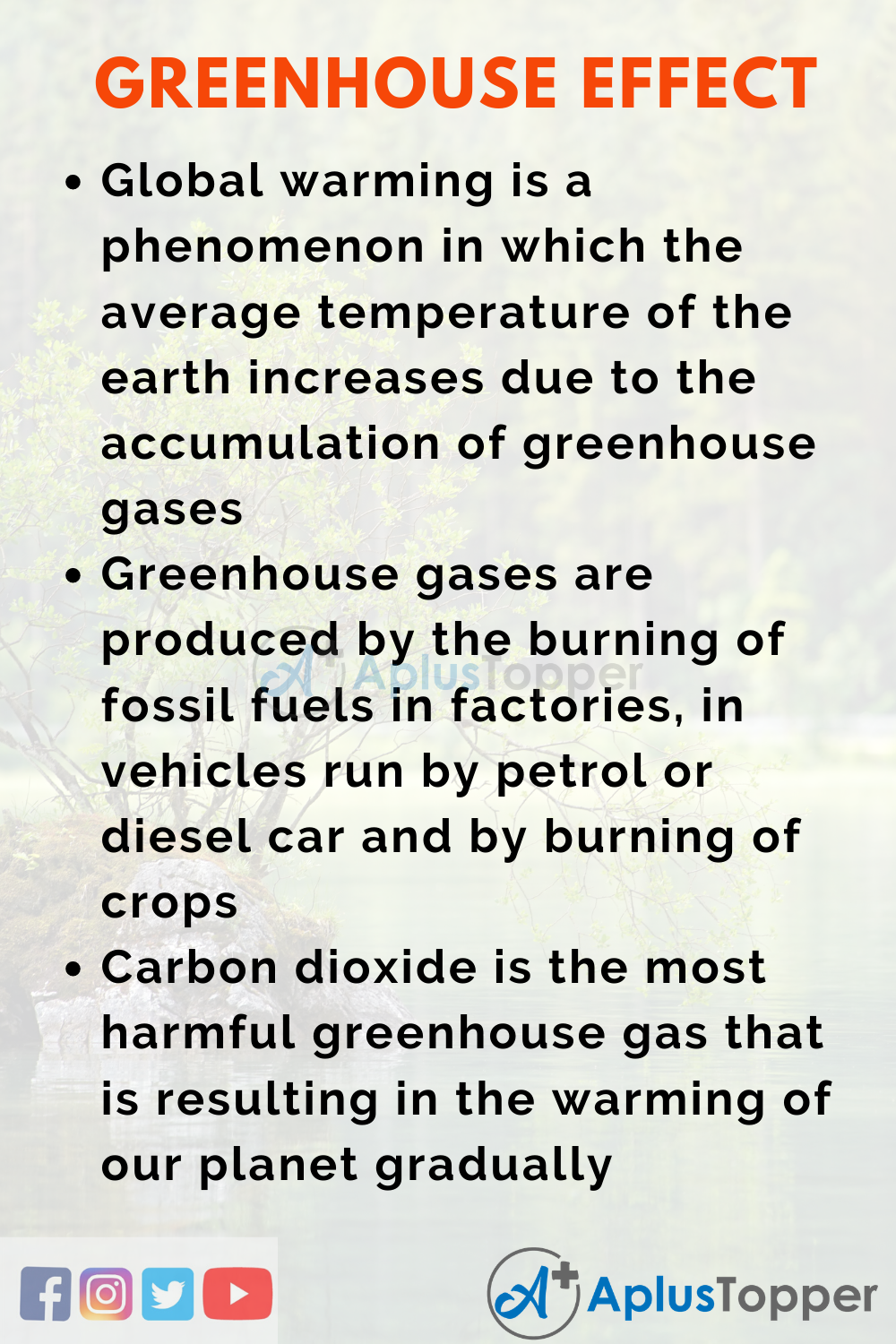Essay on Greenhouse Effect on Impact of Global Warming on Oceans: We have all experienced a little bit of the effect of the greenhouse gases accumulating in the atmosphere and climate change in the year 2020. Undoubtedly, the catastrophic and natural calamity that is happening in the year 2020 is the result of constant degradation of natural resources, global warming, climate change and how it has impacted the dynamics of ecology. In this particular greenhouse effect essay on impact of global warming on oceans, we shall be talking about how greenhouse effect impacts the ocean and how that will, in turn, impact the entire water cycle of our ecology.
You can read more Essay Writing about articles, events, people, sports, technology many more.
Long and Short Essays on Greenhouse Effect On Impact Of Global Warming On Oceans
If you are searching for a well-written greenhouse effect essay on impact of global warming on oceans, then you have come to the right place. We have provided 600-word long greenhouse effect essay on impact of global warming on oceans and a short 200-word greenhouse effect essay on impact of global warming on oceans in English. Both of these essays can be used by students of class 6, 7, 8, 9, 10, 11 and 12 for their Environmental Studies project and assignment.
Long Essay on Greenhouse Effect on Impact Of Global Warming On Oceans
The melting of the ice caps, the forest fires, earthquakes and increase in the average temperature of the earth are some of the very few impacts of global warming and climate change that we are already witnessing in the year 2020. If we can put it in the form of a birds point of view, then what we are witnessing right now is just a trailer for what is yet to come, which according to experts, is worse than what we are already witnessing in the year 2020.
In this greenhouse effect essay on impact of global warming on oceans, we shall be talking about how global warming and accumulation of greenhouse gases such as nitrogen, methane, hydrogen and carbon dioxide has adverse effects on oceans with aquatic life and other water bodies on the earth.
Due to irresponsible usage of natural resources and burning of fossil fuels coming from our vehicles, factories, burning of forests and burning of crops, the amount of carbon dioxide, nitrogen, hydrogen, methane and other greenhouse gases in the atmosphere is increasing every day. This has an adverse impact on the water cycle of nature. The water from the oceans, due to the heat from the sun, evaporate and starts condensing in the atmosphere to form clouds. These clouds, after condensation, and after attaining enough moisture, burst and the rain starts pouring on land and oceans.
This whole cycle is important for the survival of the planet and living beings in it. But due to industrialisation, globalisation and irresponsible use of natural resources, the entire dynamics of this water cycle is being affected. Scanty rainfall floods, droughts and unpredictable climatic conditions are some of the effects of global warming on oceans. The cyclone Amphan that we witnessed on the Western coast of India on the states of West Bengal, Orissa and Bangladesh has caused catastrophic and unimaginable destruction to life and property. These storms and earthquakes that we are witnessing is because of the disturbance in the water cycle and the ocean diversity of the planet.
Global warming also affects the aquatic life that is present in our oceans. According to scientists, due to an increase in the average temperature of the earth, the oxygen level in the ocean water is reducing as a result of which certain aquatic life are becoming extinct. Irresponsible dumping of toxic wastes in our oceans such as plastic waste, oil refinery waste and nuclear waste is having an adverse effect on the aquatic life of the ocean. It is estimated that an area as large as India is being filled with plastic and other sorts of dangerous waste in the Pacific ocean. What human beings have failed to understand is that these wastes percolate into the aquatic life and water which will eventually be consumed by human beings and thereby poisoning the entire food cycle of our ecosystem.
Aquatic life and water cycle are very few effects of global warming on oceans. If the accumulation of greenhouse gases in the atmosphere does not reduce, natural calamities like tsunami, floods, storms, cyclones and volcanic eruptions will become an everyday phenomenon and the life as we know it will come to an end.

Short Essay on Greenhouse Effect Impact Of Global Warming On Oceans
Industrialisation, urbanisation and population explosion has resulted in increased accumulation of poisonous greenhouse gases in the atmosphere. These poisonous gases have cascading negative impacts on the oceanic ecosystem of our planet. From affecting the water cycle to creating unpredictable climatic conditions, the effect of global warming on oceans are many. If the water cycle is affected, the oceanic currents will not be predictable by scientists and as a result of which the damage caused due to cyclones, storms and floods will increase.
Other than affecting human beings and their property, the increasing pollution of water and air is also having a negative effect on aquatic life. Dumping of oil, nuclear waste, plastic waste and other such dangerous chemicals in the ocean has led to the poisoning of the aquatic life and many aquatic beings have become extinct over the years. This poisoning of ocean, air and land will eventually come back to us in the form of the food we eat and it starts poisoning the human population.
I would like to conclude by saying that global warming is one of the biggest challenges for the international community. Every country has to come forward to reduce carbon footprint and adopt environmental-friendly green energies such as wind energy, solar energy or nuclear energy.
10 Lines on Greenhouse Effect Essay On Impact Of Global Warming On Oceans
- Global warming is a phenomenon in which the average temperature of the earth increases due to the accumulation of greenhouse gases
- Greenhouse gases are produced by the burning of fossil fuels in factories, in vehicles run by petrol or diesel car and by burning of crops
- Carbon dioxide is the most harmful greenhouse gas that is resulting in the warming of our planet gradually
- Impact of global warming results in the melting of ice caps and affecting water cycle on oceans which is basically harming the balance of our natural cycle
- Global warming in the future will lead to a decrease in oxygen content in oceans which can ultimately affect the aquatic life in our water bodies
- Proper policies should be formulated to reduce the carbon footprint of countries
- It is said that by the year 2030, the average temperature of the earth will increase by 2.5 degree Celsius
- The impact of global warming on oceans is witnessed through floods, storms, cyclones, hurricanes and other such unpredictable natural calamities
- The poisoning of the food we eat, the air we breathe and the water we drink is the result of man’s greed for economic growth at the cost of nature
- More than half of earth is covered by water and if the water bodies are slightly disturbed from its natural balance, then scientists predict that floods and tsunamis on a large scale can eliminate human civilization forever

FAQ’s on Greenhouse Effect Essay On Impact Of Global Warming On Oceans
Question 1.
How does global warming affect oceans?
Answer:
Due to an increase in the average temperature of the earth, the water in the oceans absorb the greenhouse gases and hence the oxygen content in the water reduces as a result of which aquatic life will be affected
Question 2.
What is Ocean acidification?
Answer:
Ocean acidification is a gradual process in which the water in the ocean absorbs the greenhouse gases and their pH level increases making life for aquatic animals difficult to survive
Question 3.
How to prevent global warming?
Answer:
Reducing carbon footprint and use of alternative, green forms of energy sources like nuclear energy and wind energy will help in the reduction of global warming
Question 4.
What happens if global warming is not prevented?
Answer:
If global warming is not prevented, the water cycle, the food cycle and basic structure of the ecological dynamics will be affected and will lead to many natural calamities which will eventually lead to the destruction of life and property on a massive scale
